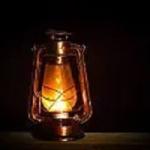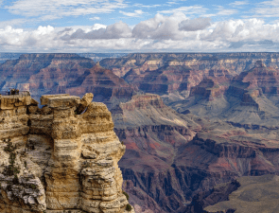 Imagine that all the objects around you—that painting, that plant, that bowl—are little doors with handles. And if you were to turn the handle and open them, like in a children’s pop-up book, what you’d find on the other side is the astounding and dazzling river of existence.
Imagine that all the objects around you—that painting, that plant, that bowl—are little doors with handles. And if you were to turn the handle and open them, like in a children’s pop-up book, what you’d find on the other side is the astounding and dazzling river of existence.
We may think some things are sacred and others profane. Some things are more holy or spiritual than others. And certainly, when we cross the threshold of a certain sacred place, like the arches of a cathedral, or the wall of a cemetery, or into our childhood room—there is usually a clear, bodily sensation of something “deeper” about the space.
But this division is an illusion. That same depth of feeling is accessible in any place, in any circumstance, at any time—provided that we are awake to it.
Spiritual community builder and ritualist Casper ter Kuile once told me that instead of thinking of the sacred as divided by vertical lines (like passing from the street into a cathedral), we can think of it as a horizontal one, that is: it doesn’t matter where you are, as long as you sink deep enough into a place, even a bus stop can become a sacred space.
In fact, a friend of mine the other week told me about being overjoyed, eyes brimming with tears, as he stood in a supermarket aisle, astounded by the abundance of choices he had.
Any facet of the world is a doorway that leads to the very heart of life. Even a wall of cereal boxes. This is true not only of physical things and spaces, but of any emotion or concept. Faith, suffering, love, joy, motion, stillness, God, no-God, many gods—any of these can serve as entry points into the rest of reality.
It’s said that a vast net of jewels hangs over the the palace of the Hindu god Indra. Every jewel contains the reflection of every other jewel. And when you look at any of those tiny reflected jewels, you see—again—that it contains the reflection of every other jewel. Like dew drops on a spider’s web. Like a fractal. On and on and on.
Everything contains everything else. And so it doesn’t matter what God you dedicate yourself to, or what spiritual teacher you sit with, or your metaphysical hunches, or how you practice. As long as you are honest in your practice and take it to its ultimate conclusion, they are all doorways.
In my experience, these many doorways lead to one of five main “gates” of spiritual awakening. They are:
- Love — warm acceptance
- Presence — alert listening
- Lightness — open ease, non-attachment
- Oneness — unity with all things; the emptiness of all things
- Humanness — awake to the realities of human life
Different spiritual teachers tend to focus on this or that particular gate, likely because that is the way by which they found their way out into the infinite, and so they are best equipped to guide others through that particular passage.
Eckhart Tolle is a master of presence, exemplified in his book, “The Power of Now.” Jack Kornfield is a master of love and compassion—you can hear it in his voice. Alan Watts on the other hand almost rarely speaks of love but is a genius of lightness and oneness.
The important thing is not which teacher or tradition you follow, but whether it resonates with you. If it resonates for you, and you take it to its final conclusion, it will eventually lead you to the same place: where all names and labels fall away, and you are left awake in a naked world.
Christ’s love and suffering is a doorway for many Christians. The Buddha’s path out of suffering is a doorway for many Buddhists. There is no contradiction in that. All paths lead to the mountaintop.
A meditator may find the secret of presence on a meditation cushion, while an extreme sports enthusiast might find presence in the razor-focused attention of a death-defying race down a mountain slope.
What constitutes a legitimate spiritual practice is not how holy it appears to be, but instead how clearly we are able to pass through this concept, feeling, experience, into the deeper oneness that lives behind and is all things. And then, how able we are to bring this understanding into our lives and the way we live.
In Zen Buddhism, there are many stories of monks attaining enlightenment in bizarre ways. One planted pine trees his whole life. Another stared at a wall for many years.
Eckhart Tolle recounts a story of one particular Buddhist monk who searched far and wide, practiced strenuously with many different teachers, but couldn’t attain enlightenment. Then he walked into a butcher’s shop and overheard a customer ask “I’d like your best piece of meat.” To which the butcher replied “all our pieces of meat are the best piece of meat.” And hearing that, he became awakened.
It doesn’t matter where you look, or how, if your search is honest and persistent, you will find that all paths lead to the same place. That everything is a doorway: A teacup. A ski slope. Meat at the deli.
The Persian poet Kabir wrote: “I laugh when I hear that the fish in the sea is thirsty.” Are you thirsty for the divine? The sacred? The clear light of awakening? All around you, the world is wet with it.












